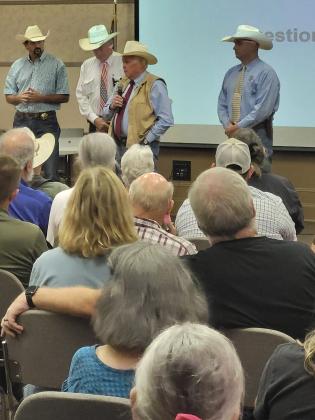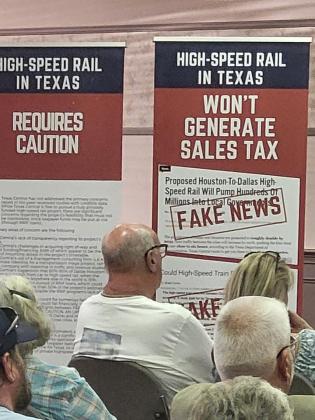Rapid rail whiplash in the Brazos Valley
On Monday, Sept. 11, an impassioned group of citizens, voters, and elected officials gathered at the Truman Kimbro Convention Center in Madisonville to hear from Texans Against High-Speed Rail (TAHSR). As the name implies, this event was scheduled to go over the most recent developments in the long battle TAHSR has been fighting against the government, Amtrak, and other entities involved in the High-Speed Rail project from Houston to Dallas.
The Kimbro Center was decorated with colorful signage, replete with warnings that the High-Speed Rail would NOT GENERATE SALES TAX, is a PRIVATE PROPERTY RIGHTS ABUSE, and has both URBAN & RURAL OPPOSITION. This last point was in full effect, as the room was packed to the brim with people from all over the Brazos Valley.
Judge Clark Osborne of Madison County gave the opening statements, introducing several of the elected officials present at the event and providing those gathered with a passionate speech himself before handing the mic off to Waller County Judge Trey Duhon.
Duhon has gone on record before saying, “If it is built, the project will hit rural and minority communities along the proposed route, like mine, the hardest,” and that same sentiment was echoed in the Kimbro Center on September 11. TAHSR came prepared with a slideshow for those new to the concept of TAHSR, with news on all the developments that have taken place from 2015-2022. The high-speed rail project has been stalled many times in the past, and TAHSR believes they know why.
Lone Star High-Speed Rail LLC was founded in 2009, changing its name to Texas Central Railway (TCR) in 2012. In July 2015, the company revealed its success in obtaining $75 million in private funding, paving the way for the project to progress from initial feasibility studies to the planning phase. On June 11, 2022, Carlos Aguilar, who had been at the helm of TCR since December 2016, stepped down as CEO, as announced in a bizarrely placed post on his LinkedIn, as noted by Duhon. Michael Bui then took over as CEO in 2022. In 2023, Amtrak initiated collaboration with TCR to revive the project, which includes the submission of applications for grant funds from federal programs.
Texans Against High-Speed Rail believes TCR has not secured enough funding for a project so expensive and partnering with a company like Amtrak to see the project through was a mistake. “You wouldn’t trust a company who lost 2 billion dollars last year with a project like this, would you?” Judge Duhon remarks, to laughter and applause. Analysts within TAHSR believe the project could cost far beyond what TCR and Amtrak have secured in funding, and the only natural course of action beyond that is to have the citizens pay for it.
Drawing lines between what one knows about how these things work and what one can infer based upon copious amounts of evidence, is that eventually the project will want to tax the same citizens they are imposing upon to build the high-speed rail that rural communities never asked for. Rep. Kyle Kacal of District 12 was in attendance, with his rallying cry of “your private property rights come first!” drawing the most applause from the large crowd heard all night. And looking at a map of the proposed route for the project, one can see the impact it will have on counties like Madison, Grimes, and Walker—and understand why landowners in the region may feel the impending imposition.
Texas Central Railway has, in the past, claimed that the highspeed rail was meant to serve the “super-commuters who travel back and forth between Houston and Dallas,” and TAHSR has made it a point to wander aloud who exactly these people are. “If you’re commuting from Houston to Dallas then I’ve got something to tell you. You’re living in the wrong town,” marks Judge Duhon. For those in rural communities being impacted by the project the most, serving the needs of what is likely an infinitesimal amount of people seems like an egregious overstep when considering how much could be at stake for those primed to lose out in this deal.


